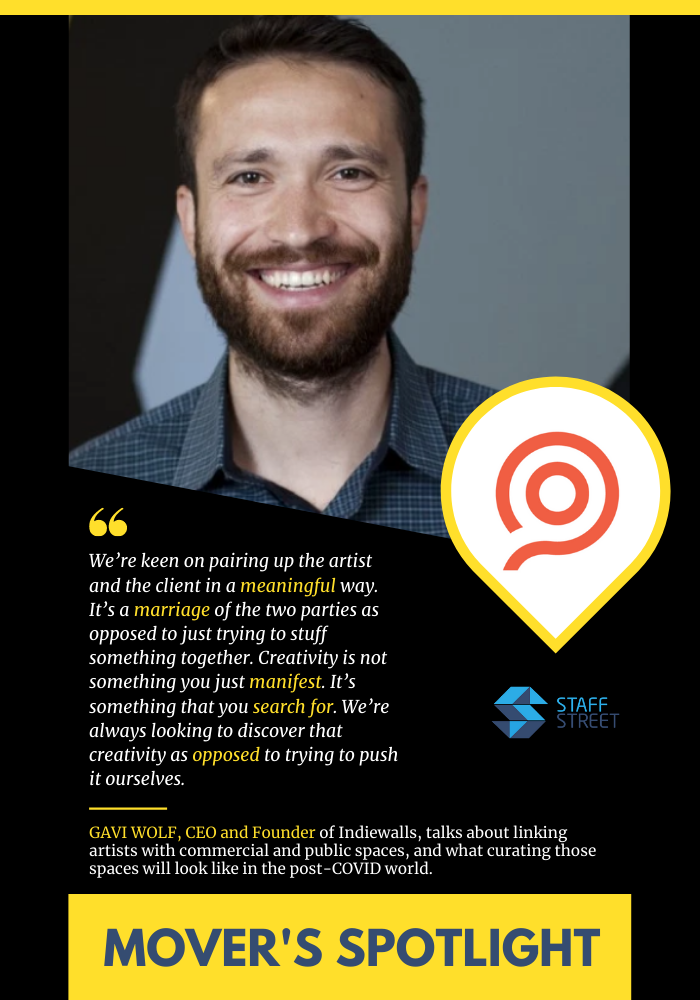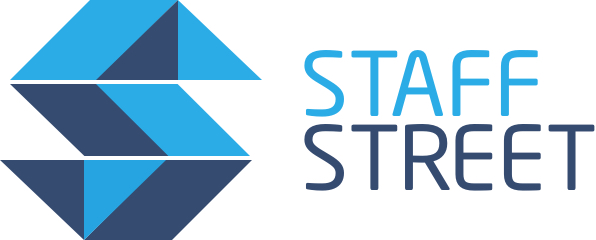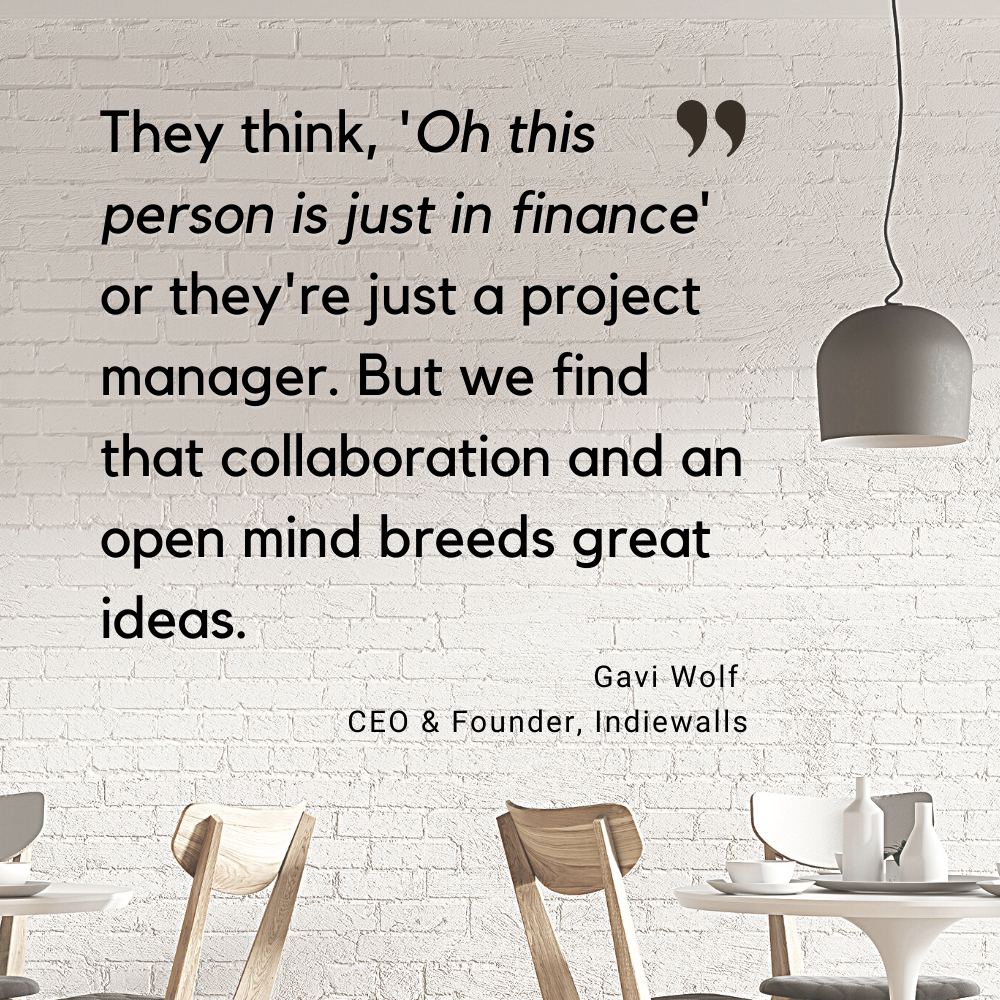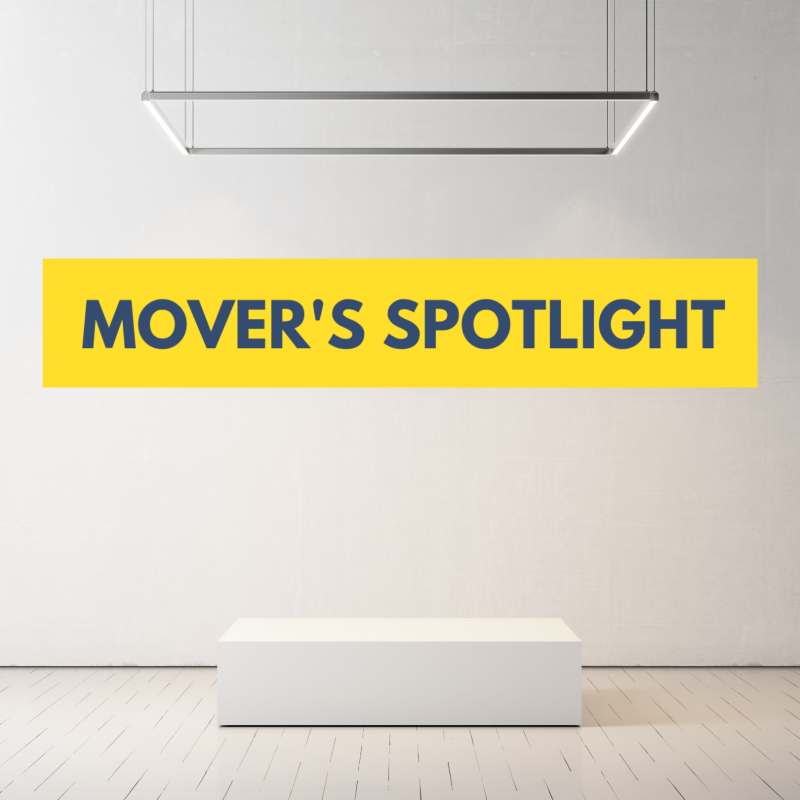
Tell us a bit about yourself, Gavi. Who you are, what got you into working in the art industry, and how you came up with Indiewalls.
Gavi Wolf: I am the CEO of Indiewalls, which I founded with Ari Grazi about nine years ago. We began as a company that helped cafes and restaurants find artwork for their spaces, selling art directly to consumers. You could go into a cafe and see artwork on the wall. A QR code underneath would lead you to our website, where you could then purchase the artwork directly off the wall. In time, we realized that it was a tough way to sell artworks to consumers. But we also found that commercial properties wanted to buy artworks to permanently own. That’s when we realized that there was a whole industry that buys artwork for commercial properties.
At Indiewalls, we work with independent artists. We source artwork for hotels, public spaces, and corporations such as Google, LinkedIn and Starbucksm effectively providing the artist with a platform and enriching the spaces with thoughtfully curated artwork.
I’m a person who is very excited by the arts and the production. The notion of how an artist gets from ideation and a blank canvas to the point of creative work. That’s what always excited me about it—the general overview of how we got to where we are and what we do.
Do your clients always know what they want, even if they say they know what they want? Or do you usually have to coax it out of them?
Gavi Wolf: I would say, more often than not, we have to coax it out of them. We’re always ready to help them along the way. Explaining to them what’s available, what we can do, how it all works, etc. Oftentimes, they give us some ideas—something they saw on Architecture Digest, or something they saw on Instagram. And we help them find the right fit and realize their vision for the artwork.
Do you think that remote work and increasing online engagement has changed people’s sense of art? Do you find that they’re more informed and purposeful about what they want to see, or are they more distracted?
Gavi Wolf: I don’t know if it’s because of remote work. I will say that it’s probably the advent of technology, how people use it, and what they’re comfortable with, as well as having access to tons of imagery constantly.
Today, people are incredibly visually literate and there are many resources for accessing artwork and new ideas. At Indiewalls, clients are always sharing images they saw on Pinterest and Instagram as inspirations for what they are trying to achieve.
I do think that working remotely has enabled people to feel more comfortable with making decisions based on seeing something online. As opposed to feeling like they need to see it in person. Even before the pandemic, people were slowly learning to become comfortable with making choices like that to some extent. But even more so at this point. People have become exponentially more comfortable with finding things online.
At the same time, how do you find the right artists to work with?
Gavi Wolf: That’s a big part of what we do. We have a community of 2,000 artists we work with from all around the world. We focus first on sourcing our own community and catalogue. But we’re also very good at finding local and specific artists. Often, we will reach out to artists in specific locations as well as using Instagram to find new artists who have the right aesthetics for particular projects. It’s a combination of always building up our own catalogue and reaching out to new artists.
I know that you have partner studios all over the world. When you say you go local, does that mean that you match artists with the commercial spaces in that city?
Gavi Wolf: The clients don’t always want to be hyperlocal. But often the client will say that they want an artist who is from a specific city or region. So, we research and find artists that fit that bill in that location based on the client’s desires.
At Staff Street this month we’re hoping to talk a little bit more about creativity. So I think it’s perfect that we’re talking to you. You might be the best person who can speak on this—do you have a creative principle that guides you in choosing the right artist to work with or the right kind of art to use for a particular business?
Gavi Wolf: A lot of times, people will think, “I can just go to any creative and ask them to create this specific thing that I want.” Maybe I want a sculpture made out of broken glass. And so, you’re like, “I know a sculpture artist can create it.” Our big belief at Indiewalls is that creatives hone their expertise over many years. They know what they’re doing in their own discipline.
Our goal is to find the creative with the vision and understanding of the specific type of artwork that the client wants. We’re keen on pairing up the artist and the client in a meaningful way. It’s a marriage of the two parties as opposed to just trying to stuff something together. Creativity is not just something you manifest. It’s something that you search for. We’re always looking to discover that creativity as opposed to trying to push it ourselves.
When it comes to the business side of things, do you find that working in art makes it easier for you to look at business situations and opportunities a little differently? Have you ever had a situation where you had to get really creative as a CEO? For example, during COVID, did you have to deal with problems where you had to think outside of the box to keep up?
Gavi Wolf: During COVID, we did a lot of brainstorming. We actually created new sister companies during COVID. One is called Indiesigns, which is creatively designed signage by artists for the pandemic—from “Stand Six Feet Apart” to “Wear a Mask” to “Wash your hand” and so on. It was very successful. We sold our signages to hotels as an alternative to the stale and boring signage that you see all of the time. We were leveraging the creativity of our artists. Being in the creative world, we needed to come up with new and unique ideas that people are really keen on.
We also created a company called Sitting Pretty Games, which is a game design company by artists. The products include puzzles, deck of cards, and so on. We have new games coming out that are really beautifully and artistically made. The idea was to offer something which we thought was really lacking in the game industry, art-wise.
Another thing we came up with was GiveASign: signages that we sent to healthcare workers, thanking them for the work that they do. We put up big banners designed by artists in front of big hospitals. I think that was also something that came from the creativity of our team and the creativity of our artists trying to give back.
How do you keep the creative juices flowing in your own organization?
Gavi Wolf: We focus on collaboration to be creative. Often people underestimate other people’s interest on a theme. They think, “Oh this person is just in finance” or they’re just a project manager. They could be really good at what they do, but the assumption is that they’re not thinking about new concepts for this or new artwork ideas.
But at Indiewalls, we find that collaboration and an open mind breeds great ideas. It’s also a great way for us to foster creativity and collectively flex our creative muscles.
Do you think graphic design has a role to play especially during a time when there’s little contact between people?
Gavi Wolf: With Indiesigns, we see that graphic design and art are a huge part of what signage is all about. What’s the whole purpose of a sign? It is meant for people to take notice of, and, based on it, take action. If the sign blends into the background, or it is not particularly clear in the visual, then the sign fails to get the message across. That defeats the purpose of signage.
Our purpose is really to create something that is visually appealing, simple to understand, and attracts people’s eyes so that they’re paying attention to what it is. This is especially crucial during COVID when you want people to understand you and take action based on what you’re saying.
The digital space for artists can be a double bind – it’s easier for artists to get a lot of attention. Being online allows them to reach more people, reach more eyes, but their art also becomes easier to plagiarize. Is that something that you’ve had to face with any of the artwork that you’ve done?
Gavi Wolf: I would say – we’ve had to deal with it lightly. Managing creative work digitally is a little bit difficult because it can be plagiarized. We focus on making sure that that doesn’t happen and we take those requests seriously. It’s definitely different from managing art in the physical space. But it’s also nice for the artists because they get more access so much more critically. It is a double-edged sword. There is opportunity to get plagiarized online more quickly and easily, but it also makes it easier to get your ideas out into the world more quickly.
Is there something about Indiewalls right now that you want to personally improve?
Gavi Wolf: The big thing we’re focused on right now is the content that we put out. We create artwork, we do our own production, we have really great people that we work with, and we want to make sure that the world understands what we’re doing in really visual and appealing and digestible ways. We’re very focused on creating stronger and better content.
Is there any advice you’d give other people who are just starting out in the art business? (artists)
Gavi Wolf: If they’re looking to get into the commercial industry, I think it’s about constantly reaching out to people, figuring out what they can provide that’s easily understood and digitally dramatic, impressive and fun. People are looking for positivity in their spaces, especially in public spaces. Creating artwork that conveys that positive energy is a great way to get into the commercial world.
Where is Indiewalls headed to this year?
Gavi Wolf: We’re focused on growth as always, as well as creating more robust content and promoting our brand in a stronger way. We’re also focused on expanding our opportunities and getting more reach into a wider range of spaces, including offices and residences.
So, a lot of talk about whether or not companies are going back to the office. Do you think there are other opportunities or markets for you to tap into, like people building home offices or remote work?
Gavi Wolf: Yes. What I think is going to happen is people will work from home, but people will also have offices that they’ll come into. They will be smaller, but clients will focus more on making them more appealing and beautiful places to be at. Quality over quantity so to speak. That’s a great opportunity for us. Let’s have an office that can be a little more transient where only 50% of our staff is there at any given time, but we’re going to spend what we save on space on making that space really beautiful.









